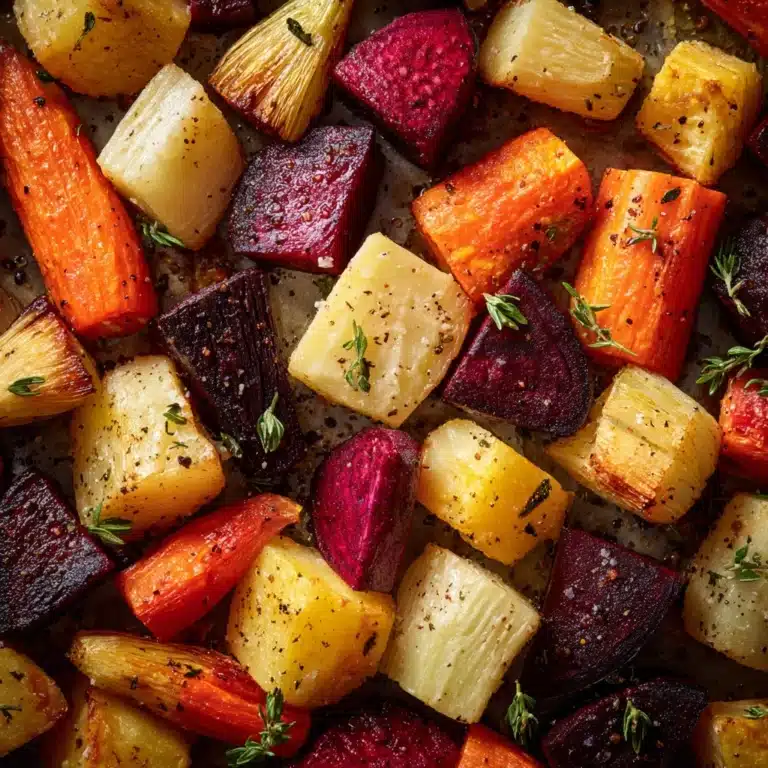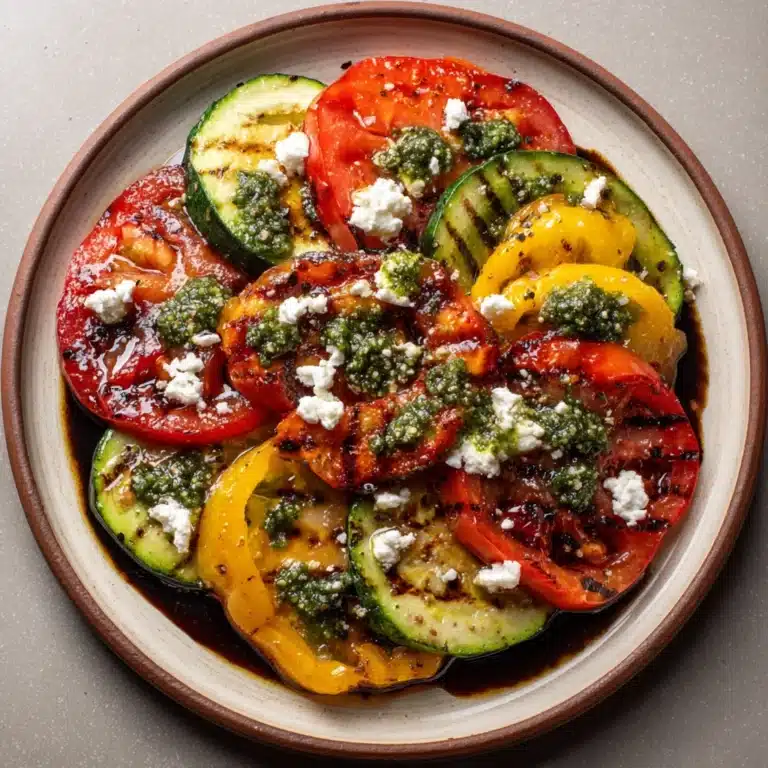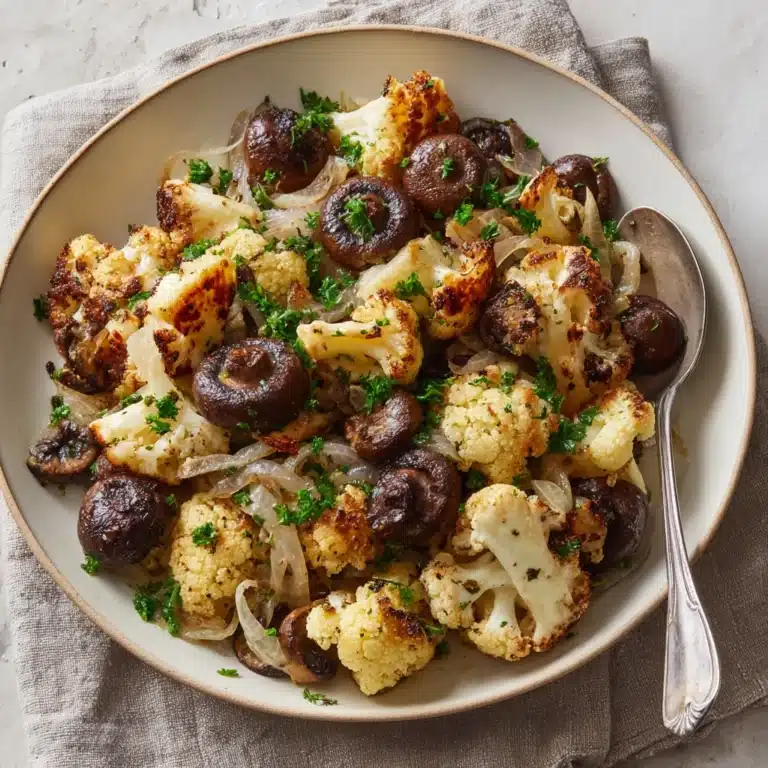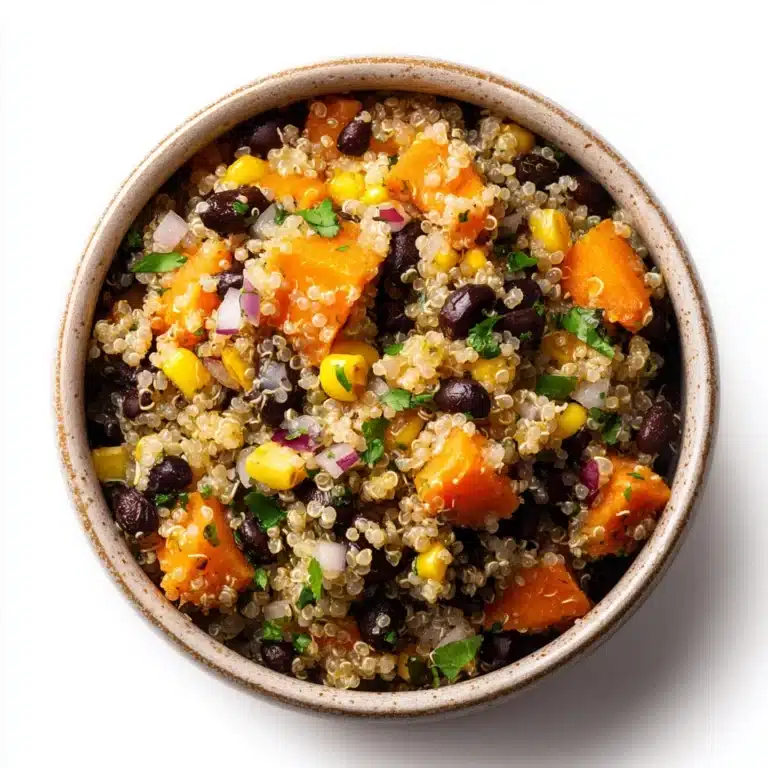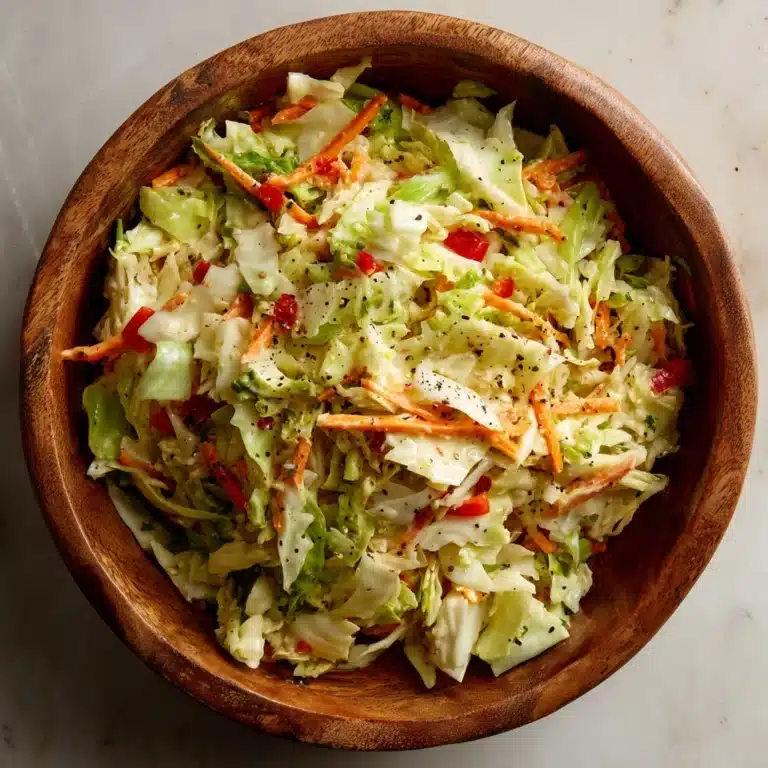Spicy Korean Carrots Recipe
If you’re searching for a flavor-packed, vibrant side that wows friends and family, look no further than Spicy Korean Carrots. A harmonious blend of crisp-tender carrot strips, punchy garlic, tangy vinegar, and the fiery kick of gochugaru, this vegan and gluten-free favorite delivers the kind of undeniable, addictive flavor you crave. It’s a snap to prepare, keeps beautifully in the fridge, and only gets better as the ingredients mingle. No matter the occasion — weeknight meals, potlucks, or a snack on its own — Spicy Korean Carrots promise to bring excitement, color, and just the right touch of spice to your table.
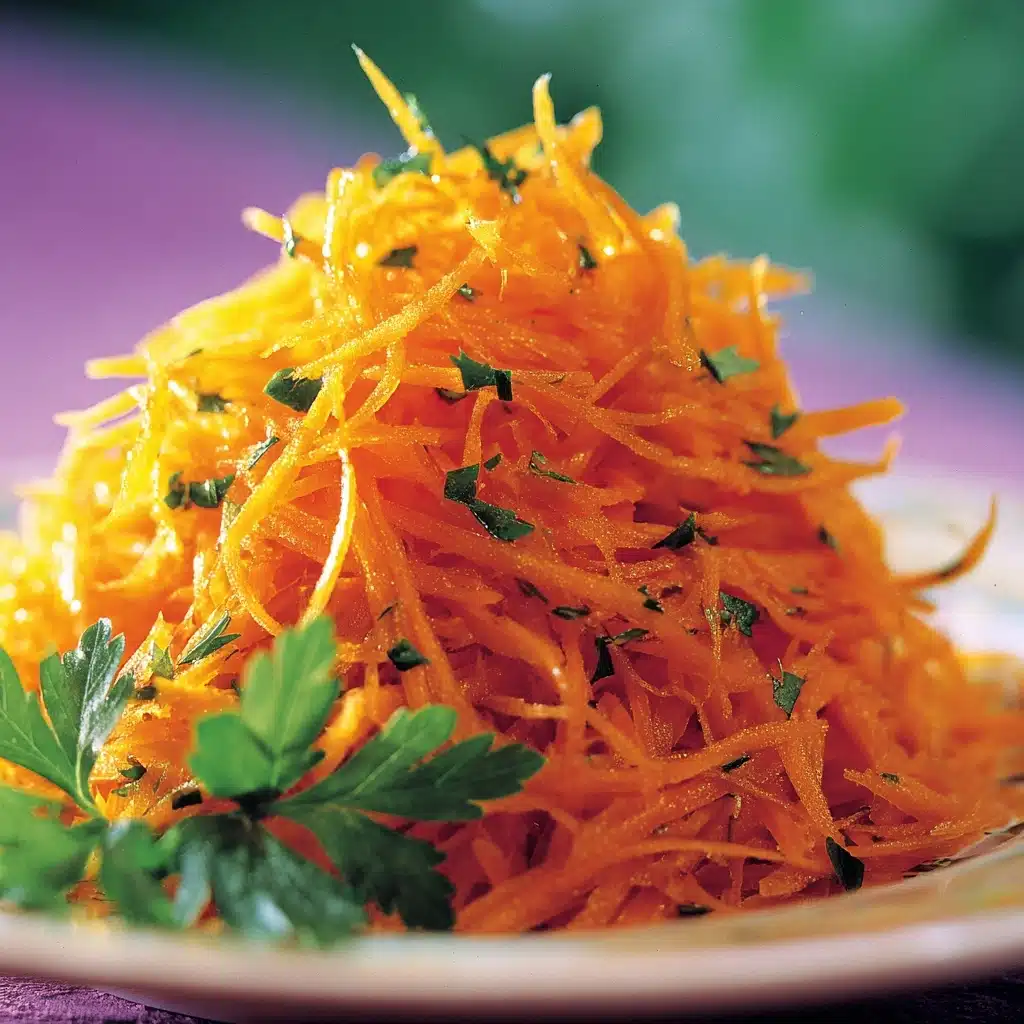
Ingredients You’ll Need
The beauty of Spicy Korean Carrots lies in its simple yet impactful ingredient list. Every item here pulls its weight, boosting flavor, texture, or visual appeal to create an unforgettable bite.
- Carrots: Choose fresh, firm carrots and julienne them for maximum crunch and visual appeal.
- Vegetable oil: Provides a luscious coating and helps meld the garlic flavor into the carrots.
- Garlic cloves: Sautéing garlic in the oil releases its aroma and depth — don’t skip this step!
- Rice vinegar: Adds that bright, tangy quality essential for balancing the bold spices.
- Soy sauce: Delivers savory umami and deepens the overall flavor profile.
- Sugar: A little bit of sweetness rounds out the heat and acidity.
- Korean red pepper flakes (gochugaru): These flakes provide the signature color and adjustable heat of Spicy Korean Carrots.
- Ground coriander: Lends subtle warmth and a faint citrusy note that pairs beautifully with carrots.
- Salt: Essential for drawing out moisture and enhancing every ingredient.
- Black pepper: Gives a subtle background heat and earthy sharpness.
- Sesame seeds (optional): Toasted seeds add a wonderful nutty crunch on top.
- Fresh cilantro (optional): Chopped cilantro brings a pop of color and herbal freshness.
How to Make Spicy Korean Carrots
Step 1: Prep the Carrots
Start by peeling your carrots and slicing them into thin, even julienne strips. Uniformity means they’ll absorb the marinade evenly and look extra appealing on your plate. Place them into a big mixing bowl, making sure they’re ready to soak up all that flavor.
Step 2: Sizzle Garlic in Oil
In a small skillet, heat the vegetable oil over medium heat. Once hot, toss in the minced garlic and let it cook for about 30 seconds, just until fragrant. This brief sautéing draws out all those savory garlic oils, infusing the sauce with a mouthwatering aroma.
Step 3: Pour Over Carrots
Immediately take that hot, garlicky oil and pour it directly onto the carrots. This “shocking” technique gently wilts the carrots at the surface and starts to mingle the flavors instantly.
Step 4: Add Seasonings
Now, add your rice vinegar, soy sauce, sugar, gochugaru, ground coriander, salt, and black pepper right into the bowl. Toss everything thoroughly until each carrot stick is beautifully and evenly coated with the vibrant marinade. Take a moment to appreciate that lovely color combo!
Step 5: Let the Flavors Develop
The hardest part is letting the Spicy Korean Carrots rest so the flavors can meld. For the best kick, let them sit at room temperature at least 30 minutes (though 2 hours in the fridge makes them even more irresistible). Stir once more before serving, then garnish with sesame seeds and plenty of fresh cilantro if you wish.
How to Serve Spicy Korean Carrots
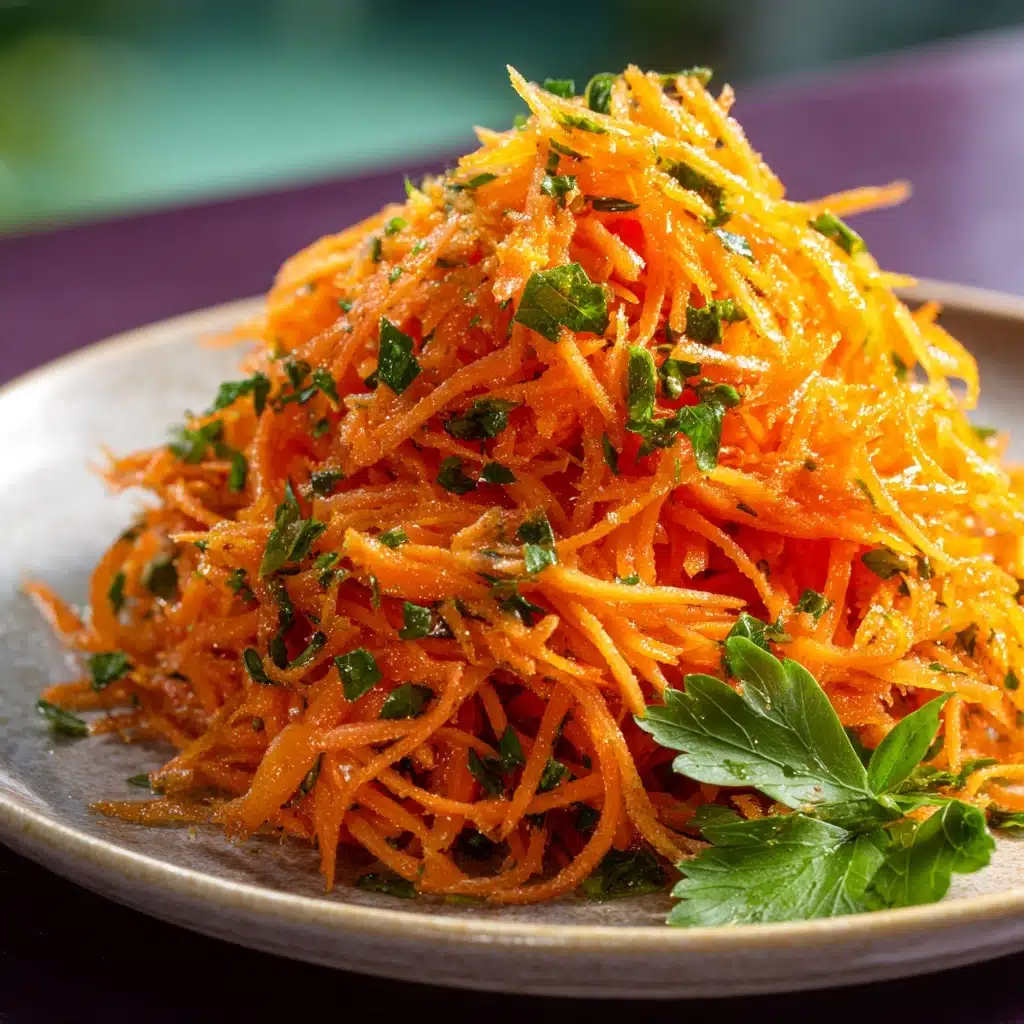
Garnishes
It only takes a sprinkle of toasted sesame seeds and a handful of bright green cilantro to transform these Spicy Korean Carrots into a feast for the eyes. Don’t underestimate the finishing touch — a little garnish goes a long way in both flavor and presentation.
Side Dishes
Spicy Korean Carrots make a fantastic banchan alongside rice and your favorite Korean mains like bulgogi, tofu stir-fries, or crispy vegetable pancakes. They’re also a punchy addition to grain bowls or picnic spreads with grilled proteins, thanks to their crunchy and tangy contrast.
Creative Ways to Present
Take your presentation up a notch by stuffing Spicy Korean Carrots into lettuce wraps, rolling them into nori sushi, or layering them over avocado toast for a spicy-sweet upgrade. The vibrant color and kicky flavor brighten just about any plate.
Make Ahead and Storage
Storing Leftovers
Spicy Korean Carrots store wonderfully in an airtight container in the fridge for up to four days. In fact, they taste even better after a day as the flavors mingle and the carrots soak in all that punchy marinade.
Freezing
Freezing isn’t recommended, as the carrots may lose their distinctive crunch and vibrant color once thawed. Stick to making a fresh batch you can enjoy throughout the week.
Reheating
This dish is at its best served cold or slightly chilled, so skip reheating. If you want to bring them to room temperature, just let the portion sit on the counter for about ten minutes before serving.
FAQs
Can I adjust the spice level?
Absolutely! If you prefer a milder flavor, reduce the gochugaru. For extra heat, add an extra pinch or splash in a few chili flakes — Spicy Korean Carrots are endlessly customizable to your taste buds.
What if I don’t have gochugaru?
While gochugaru is traditional and offers a fruity, mildly smoky flavor, you can substitute with crushed red pepper flakes in a pinch. The result will be slightly different, but still delicious.
Are Spicy Korean Carrots really vegan and gluten-free?
They certainly are! Just make sure your soy sauce is certified gluten-free if you’re sensitive. Every ingredient in this recipe is plant-based and naturally gluten-free (with that small soy sauce tweak).
How long do Spicy Korean Carrots need to marinate?
At least 30 minutes will do if you’re in a rush, but two hours (or even overnight) in the fridge truly allows all those bright, bold flavors to soak in. Patience pays off!
Can I make a large batch for a crowd?
You bet! Simply scale up the ingredients, grab your largest bowl, and mix away. These Spicy Korean Carrots are a total hit at potlucks, BBQs, and picnics, and prepping extra means happy guests and zero leftovers.
Final Thoughts
If you’ve never tried your hand at making Spicy Korean Carrots, this is your sign to dive in — your taste buds will thank you! Let the sweet, spicy, garlicky crunch brighten up your next meal, and don’t be surprised if you start making this refreshing side on repeat. Happy munching!
Print
Spicy Korean Carrots Recipe
- Total Time: 20 minutes (plus chilling time, if desired)
- Yield: 4 servings 1x
- Diet: Vegan, Gluten-Free
Description
These Spicy Korean Carrots are a vibrant and flavorful side dish that packs a spicy punch. Made with julienned carrots marinated in a zesty blend of Korean-inspired seasonings, these carrots are perfect for adding a kick to any meal.
Ingredients
Carrots:
- 1 pound carrots, peeled and julienned
Seasoning:
- 2 tablespoons vegetable oil
- 3 garlic cloves, minced
- 1 tablespoon rice vinegar
- 1 tablespoon soy sauce
- 1 teaspoon sugar
- 1 teaspoon Korean red pepper flakes (gochugaru)
- 1/2 teaspoon ground coriander
- 1/2 teaspoon salt
- 1/4 teaspoon black pepper
Garnish (optional):
- 1 tablespoon sesame seeds
- 1 tablespoon chopped fresh cilantro
Instructions
- Prepare Carrots: Place the julienned carrots in a large bowl.
- Make Seasoning: In a small skillet, heat the vegetable oil and sauté the minced garlic until fragrant. Pour the hot oil over the carrots.
- Add Flavor: Mix in rice vinegar, soy sauce, sugar, gochugaru, coriander, salt, and pepper until well combined.
- Marinate: Allow the carrots to sit for at least 30 minutes at room temperature or refrigerate for 2 hours.
- Serve: Before serving, stir the carrots well and garnish with sesame seeds and cilantro if desired.
Notes
- Adjust the spice level by varying the amount of gochugaru.
- Flavors develop more over time; refrigerate for up to 4 days.
- Prep Time: 15 minutes
- Cook Time: 5 minutes
- Category: Side Dish
- Method: Stovetop, No-Cook
- Cuisine: Korean-Inspired
Nutrition
- Serving Size: 1/2 cup
- Calories: 110
- Sugar: 5 g
- Sodium: 350 mg
- Fat: 7 g
- Saturated Fat: 0.5 g
- Unsaturated Fat: 6.5 g
- Trans Fat: 0 g
- Carbohydrates: 10 g
- Fiber: 3 g
- Protein: 1 g
- Cholesterol: 0 mg
